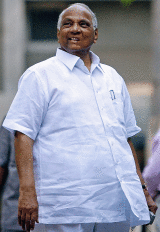A crucial relationship
Why cricket needs both India and England, and what they represent
19-Jul-2007
|
|

|
Okay, it's not quite the Ashes or India v Pakistan. It doesn't even carry the needle and tension of a contest between England and Pakistan, or the piquancy of a trans-Tasman rivalry. There has been the odd stirring performance - Vinoo Mankad's bravery in 1952, Ian Botham's all-round solo in the Jubilee Test, Sunil Gavaskar's fourth-innings double hundred at The Oval, Rahul Dravid's masterpiece at Headingley, and Andrew Flintoff's insouciance at the Wankhede Stadium - but over its 75-year history, India v England has been devoid of sustained spark and sharpness.
That said, a lot rides on this series. A soulless World Cup has shaken the faith of cricket fans round the world, not to speak of that of sponsors and television companies. The misery has only been piled on since then. We have seen Bangladesh being thrashed senseless by their neighbours, West Indies' capitulation against England in three Tests, the reprehensible Afro-Asia Cup, and some pointless one-day cricket in Ireland and Scotland. Cricket is desperate for a renewal, a wholesome display of skills, a few individual sparks, and contests worthy of the game. It is an opportunity for England and India to rise above their lacklustre past; and they have the tools to do so.
It is a pity that Flintoff won't be playing - what a tragedy it will be for cricket if he is unable to ever recapture his form of 2005-06 - but England will still have the advantage of home conditions. It was swing that did it for them in 2005, and while they will miss the old-ball mastery of Flintoff and Simon Jones, in Matthew Hoggard - if and when he plays - and the rediscovered Ryan Sidebottom, they have two fine exponents of new-ball swing. Their batting looks solid if not spectacular, and Matt Prior has added a new dimension to the lower order.
But India are far less likely to be rolled over than West Indies. Their batting might never again scale the heights of 2003-04, but their ageing middle order still possesses plenty of class and experience. Most important, Sachin Tendulkar's fire seems to have been rekindled, and the prospect of him being willing to dominate bowlers again is a delicious one. VVS Laxman and Sourav Ganguly have missions of their own, and there isn't any evidence yet that Rahul Dravid's batting is being weighed down by the mental pressures of the captaincy. And ironically, the seam-and-swing-friendly conditions in England will provide Indian bowlers with the best chance of taking 20 wickets in a Test. England might prevail in the end, but it is reasonable to expect a close series.
But the importance of India and England to the world of cricket goes far beyond the field. It has evolved into a complex, multi-layered relationship that has come to acquire massive significance. Cricket is a small world but there is no escaping the reality that it is a polarised one, and polarised still, regrettably enough, along cultural and racial lines. England may not have been a dominant force on the cricket field in the last three decades, but it remains the guiding light for countries like Australia and New Zealand. India, the new powerhouse of cricket, has meanwhile forged a powerful subcontinental alliance with Pakistan, Sri Lanka and Bangladesh. West Indies retain close ties with England, and South Africa continue to dither.
Cricket presented the picture of a happy family last month when the two principal factions struck a cosy deal over the ICC presidency. England's David Morgan gets the first stab at the job, but India's Sharad Pawar will be in the chair when the subcontinent hosts the World Cup in 2011. Cricket has been spared the prospect of a messy election and the lobbying and deal-making that accompany one.
But only the innocent will be fooled into believing that this agreement was the result of either or both sides discovering the spirit of accommodation and co-operation. It was more to do with the fact that someone was bound to get a bloody nose, but neither side knew who. The votes had been tied in the earlier round, and neither wanted to risk defeat. A compromise suited everyone.
|
|

|
Morgan is, by all accounts, a diligent but - as demonstrated by his paralysis over the Zimbabwe issue in 2003 - weak leader. He will head world cricket for two years before Pawar, a wily politician and capable administrator, but with no real affinity and feel for cricket, takes over for two more. But the real worry is: to what degree will deals of convenience of this nature compromise the administration of the game?
Will the Zimbabwe problem be swept under the carpet? Will a voice rise within the ICC against the insanity of the international playing calendar? Will someone stop the ICC from piling one World Cup on top of another? A divided game is bad, but it is far worse if administrators find expedient compromises on the issues vital to cricket.
India and England represent two different worlds in cricket. The game needs India's enterprise, passion and money. Equally, it needs to uphold the traditional values engendered and upheld by English cricket. England and Australia remain the real home of Test cricket, and to watch a full house at Lord's or the MCG during a Test match remains among the most uplifting experiences in cricket.
Test cricket is the supreme form of the game, and the most rewarding form for players and connoisseurs alike. It is an ideal worth fighting for to preserve. From a cricket lover's point of view it was distressing that the English and Indian cricket boards chose to sacrifice a Test this summer in favour of a couple of additional one-dayers.
Cricket needs the entrepreneurial spirit championed by India - indeed the ICC would have long since been bankrupt without India - but it also needs a strong counterbalance against the adventurism of the Indian board and the senseless proliferation of the one-day game promoted by it. The rise of India was essential to break the unhealthy monopoly England and Australia exercised over cricket. In the same way, the Indian board which, like it or not, will remain the most influential body in world cricket, should not be allowed to control the agenda of international cricket.
Some see England as cricket's past and India as its present. Cricket is not a sport that can do without its past. A balance between enterprise and tradition is vital to the health of the game.
Sambit Bal is the editor of Cricinfo and Cricinfo Magazine